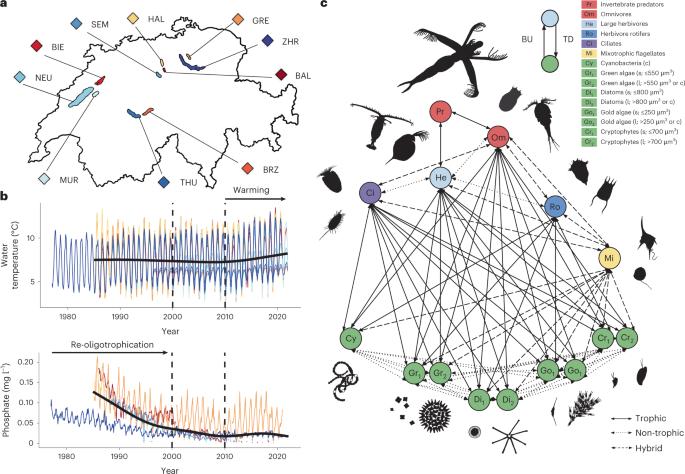气候变化和营养波动对湖泊生态网络的破坏
IF 29.6
1区 地球科学
Q1 ENVIRONMENTAL SCIENCES
引用次数: 3
摘要
气候变化与当地进程相互作用,破坏了复杂的生态互动网络,从而威胁到生物多样性。虽然网络互动的变化会对生态系统产生巨大影响,但生态网络如何应对气候变化,特别是气候变暖和营养供应波动,在很大程度上还是未知数。在此,我们利用无方程建模方法对瑞士十个湖泊的浮游生物群落月度数据进行了研究,结果表明浮游生物群落相互作用的数量和强度会随水温和磷的变化而波动,并做出非线性反应。虽然湖泊表现出特定的系统反应,但气候变暖通常会减少网络互动,尤其是在磷酸盐含量较高的情况下。这种网络重组改变了食物网的营养控制,导致消费者受资源控制。小型食草动物和蓝藻成为浮游生物网络变化的敏感指标。通过揭示环境驱动因素之间复杂相互作用的结果,我们的研究结果为研究和进一步了解气候变化如何影响整个生态群落提供了工具。作者研究了气候变暖和营养供应对瑞士十个湖泊中整个生态网络的影响。气候变暖通常会减少网络的相互作用,尤其是在高磷酸盐条件下,从而导致食物网的营养控制发生变化。本文章由计算机程序翻译,如有差异,请以英文原文为准。

Disruption of ecological networks in lakes by climate change and nutrient fluctuations
Climate change interacts with local processes to threaten biodiversity by disrupting the complex network of ecological interactions. While changes in network interactions drastically affect ecosystems, how ecological networks respond to climate change, in particular warming and nutrient supply fluctuations, is largely unknown. Here, using an equation-free modelling approach on monthly plankton community data in ten Swiss lakes, we show that the number and strength of plankton community interactions fluctuate and respond nonlinearly to water temperature and phosphorus. While lakes show system-specific responses, warming generally reduces network interactions, particularly under high phosphate levels. This network reorganization shifts trophic control of food webs, leading to consumers being controlled by resources. Small grazers and cyanobacteria emerge as sensitive indicators of changes in plankton networks. By exposing the outcomes of a complex interplay between environmental drivers, our results provide tools for studying and advancing our understanding of how climate change impacts entire ecological communities. The authors investigate the impact of warming and nutrient supply on entire ecological networks within ten Swiss lakes. Warming generally reduces network interactions, particularly under high phosphate, leading to shifts in trophic control of food webs.
求助全文
通过发布文献求助,成功后即可免费获取论文全文。
去求助
来源期刊

Nature Climate Change
ENVIRONMENTAL SCIENCES-METEOROLOGY & ATMOSPHERIC SCIENCES
CiteScore
40.30
自引率
1.60%
发文量
267
审稿时长
4-8 weeks
期刊介绍:
Nature Climate Change is dedicated to addressing the scientific challenge of understanding Earth's changing climate and its societal implications. As a monthly journal, it publishes significant and cutting-edge research on the nature, causes, and impacts of global climate change, as well as its implications for the economy, policy, and the world at large.
The journal publishes original research spanning the natural and social sciences, synthesizing interdisciplinary research to provide a comprehensive understanding of climate change. It upholds the high standards set by all Nature-branded journals, ensuring top-tier original research through a fair and rigorous review process, broad readership access, high standards of copy editing and production, rapid publication, and independence from academic societies and other vested interests.
Nature Climate Change serves as a platform for discussion among experts, publishing opinion, analysis, and review articles. It also features Research Highlights to highlight important developments in the field and original reporting from renowned science journalists in the form of feature articles.
Topics covered in the journal include adaptation, atmospheric science, ecology, economics, energy, impacts and vulnerability, mitigation, oceanography, policy, sociology, and sustainability, among others.
 求助内容:
求助内容: 应助结果提醒方式:
应助结果提醒方式:


